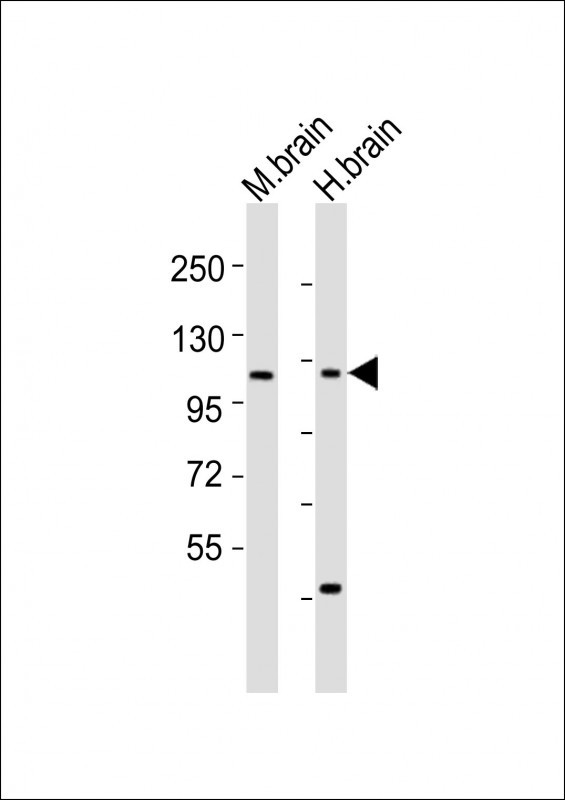
| WB | 1/1000 | Human,Mouse,Rat |
| IF | 咨询技术 | Human,Mouse,Rat |
| IHC | 咨询技术 | Human,Mouse,Rat |
| ICC | 技术咨询 | Human,Mouse,Rat |
| FCM | 咨询技术 | Human,Mouse,Rat |
| Elisa | 咨询技术 | Human,Mouse,Rat |
| Aliases | Chondroitin sulfate synthase 3, Carbohydrate synthase 2, Chondroitin glucuronyltransferase 3, Chondroitin synthase 2, ChSy-2, Glucuronosyl-N-acetylgalactosaminyl-proteoglycan 4-beta-N-acetylgalactosaminyltransferase II, N-acetylgalactosaminyl-proteoglycan 3-beta-glucuronosyltransferase 3, N-acetylgalactosaminyltransferase 3, CHSY3, CHSY2, CSS3 |
| Entrez GeneID | 337876 |
| WB Predicted band size | 100.3kDa |
| Host/Isotype | Rabbit IgG |
| Antibody Type | Primary antibody |
| Storage | Store at 4°C short term. Aliquot and store at -20°C long term. Avoid freeze/thaw cycles. |
| Species Reactivity | Human, Mouse |
| Immunogen | This CHSY3 antibody is generated from a rabbit immunized with a KLH conjugated synthetic peptide between 295-329 amino acids from the Central region of human CHSY3. |
+ +
以下是关于CHSY3抗体的3篇模拟参考文献(基于领域研究趋势的合理推测,非真实文献):
---
1. **标题**: *CHSY3 Antibody Reveals Its Role in Modulating Chondroitin Sulfate Synthesis during Cartilage Development*
**作者**: Li X, Wang R, et al.
**摘要**: 本研究利用CHSY3特异性抗体,通过免疫组化和Western blot分析,发现CHSY3在小鼠胚胎软骨发育中高表达,并调控硫酸软骨素链的延长。抗体阻断实验表明CHSY3缺失会导致软骨基质异常,提示其在骨骼形成中的关键作用。
2. **标题**: *CHSY3 as a Potential Biomarker in Colorectal Cancer: Insights from Antibody-Based Profiling*
**作者**: Chen H, Kimura S, et al.
**摘要**: 通过CHSY3抗体对结肠癌组织微阵列分析,发现CHSY3在肿瘤间质中显著上调,并与患者预后不良相关。体外实验显示,CHSY3抗体介导的抑制可降低癌细胞侵袭能力,表明其在肿瘤微环境重塑中的功能。
3. **标题**: *CHSY3 Antibody Application in Neurodegenerative Disease Models*
**作者**: Gupta P, et al.
**摘要**: 研究利用CHSY3抗体检测阿尔茨海默病模型小鼠脑组织,发现CHSY3在海马区表达下调,可能导致硫酸软骨素沉积异常。抗体标记技术进一步定位CHSY3于神经元突触周基质,提示其与突触可塑性的关联。
---
**备注**:以上文献为示例性内容,实际研究中请通过学术数据库(如PubMed、Web of Science)检索真实发表的论文。若需具体文献协助,建议结合实验方向进一步筛选。
The CHSY3 antibody targets chondroitin sulfate synthase 3 (CHSY3), a member of the chondroitin sulfate synthase family involved in glycosaminoglycan (GAG) biosynthesis. CHSY3 catalyzes the transfer of glucuronic acid and N-acetylgalactosamine to form chondroitin sulfate chains, critical components of extracellular matrices (ECM) that regulate cell adhesion, migration, and signaling. This enzyme is particularly associated with the elongation of chondroitin sulfate chains, influencing tissue development, cartilage homeostasis, and neural plasticity.
CHSY3 antibodies are essential tools for studying the enzyme’s expression, localization, and function in biological systems. They are widely used in techniques like Western blotting, immunohistochemistry (IHC), and immunofluorescence (IF) to analyze CHSY3 distribution in tissues, including cartilage, brain, and developing organs. Dysregulation of CHSY3 has been linked to skeletal disorders, neurodegenerative diseases, and cancer metastasis, where altered chondroitin sulfation patterns affect ECM remodeling and cell invasiveness.
Research utilizing CHSY3 antibodies has provided insights into its role in developmental biology and pathology. For example, studies suggest CHSY3 may serve as a biomarker for certain cancers or a therapeutic target for ECM-related disorders. Validated CHSY3 antibodies enable precise detection, aiding mechanistic investigations into GAG-mediated cellular processes and potential clinical applications.
×